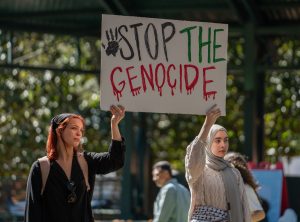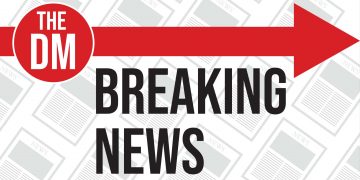
“Everybody here is numb. The oppression has been ongoing for 75 years, and everybody is numb to it. Palestinians will be killed for the rest of our lives, and that’s something that people are okay with,” Khalil Abualya, a senior pharmacy major, said. “We’re here to change that today, God willing.”
Approximately 50 students of all races and creeds assembled in the Grove on Wednesday, Oct. 25 to peacefully protest the Israeli occupation of Gaza and the West Bank. The event was organized by the Muslim Student Association, but Abualya, president of the MSA, made clear that the protest was not religious in nature.
“This is not a religious issue, it’s not a political issue, it’s a humanitarian issue. There are over 2,000 kids that have been killed (in Gaza) in less than two weeks,” Abualya said. “Are the two million people living in Gaza all Hamas militants? Were the 2,000 children killed in Gaza Hamas militants?”
Abualya spent much of his life in Palestine, and some of his family members are counted in the 5,000 death toll in Gaza and the West Bank due to the recent Israeli bombing campaign in retaliation to a Hamas offensive on Oct. 7, in which over a thousand Israeli civilians were killed and hundreds were taken hostage. The University of Mississippi Hillel held a candlelight vigil for victims of the attack on Oct. 13.
“I have lost family already in Palestine, I’ve lost family in the West Bank and I’ve had family members that have been taken to prison in the West Bank with administrative detention, they are not taken to court,” Abualya said. “I am an American citizen, and I have the right to say what I need to say, I have the right to tell members of my government, ‘You guys are supporting something that I do not stand for.’ It is our duty to use that right for the better. Even if I wasn’t Palestinian, I would stand for Gaza, because I am a human.”
Israeli Defense Minister Yoav Gallant called for a “complete siege” on Gaza and claimed that the Israeli Defense Forces were fighting against “human animals.” Israel also utilizes chemical weapons like white phosphorus against Palestinians, which is illegal under international law.
“We (Palestinians) can’t live peacefully because we are viewed as subhuman by Israel,” Abualya said. “As a Muslim, I condemn the killing of all innocent people, but I also condemn the (IDF) killing of women and children, I condemn the use of chemical weapons on civilian populated areas, I condemn bombing one of the most densely populated places on the planet.”
Adam Soltani, a junior studying biochemistry, is vice president of the MSA.
“In America, it’s really hard to mobilize support for Palestinians. We are only asking that the blockade imposed by Israel in Gaza be lifted,” Soltani said. “It’s been a real grassroots effort from the Muslim Student Association on campus and a bunch of people who are concerned about the state of the region. You see people (protesting) that are not even Arab or Muslim – you don’t have to be of any specific denomination, you just have to be human.”
Soltani condemned the IDF’s collective punishment campaign against Palestinians.
“The collective punishment that’s banned under international law, the complete blockade that has created one of the biggest humanitarian crises that we have seen in the region – the same way we condemn Hamas, we condemn what the IDF and Israeli government are doing to people that have nothing to do with the conflict,” Soltani said. “The issue is innocent civilian deaths. You can’t ever compare human loss and death, but in the span of two weeks almost 6,000 people have been killed, the vast majority of whom have nothing to do with the conflict.”
Soltani spoke about how the Israeli blockade of essential resources to Palestinians such as electricity, food and drinking water hits the young and elderly the hardest.
“Hospitals are being shut down because of a lack of electricity, so more deaths are on the way,” Soltani said. “A lot of the people being targeted are elderly people and children, who are the most susceptible to energy losses, water losses and food losses.”
Kennady Hertz is a graduate student studying integrated marketing communications, and she came out to the protest after studying the plight of Gazans in her public policy leadership courses.
“I studied this issue in my class last year, peace and conflict studies with the public policy major, and I’ve been following it and learning more every day. A lot of influential people like celebrities and politicians have not been truthful about what is going on, and there is a lot of disinformation on the internet,” Hertz said. “I feel like a good way to create positive change is to go in person and show out for these people (Palestinians) that need help.”
Shrishti Srivastava, a sophomore psychology major, went to the protest because she feels like an ethnic cleansing is unfolding before her eyes.
“I think what’s currently happening in Palestine is a travesty. It’s so disheartening to witness an ethnic cleansing, and we are just letting it happen,” Srivastava said.
Iman Gohar is a retired UM assistant professor of civil engineering who immigrated from Egypt.
“My background is Egyptian, but I’m a US citizen. This is my home, Oxford is my home. We try to make our voices reach even though we are not there (Gaza), but we are trying to tell them (Palestinians) that we are behind them, that we support each other,” Gohar said.
Gohar came out to protest the loss of human life and killing perpetrated by both the IDF and Hamas.
“I came out to support the human beings in Gaza and in Israel, what is happening on both sides is not acceptable by any means. That is what we encourage people to understand, we are not terrorists, we do not want to kill anybody, we want to live in peace together,” Gohar said. “The loss of human life is unbelievable, it is something that you can’t bear, you can’t just witness it, you can’t be a part of it, you have to be part of the solution.”
Assistant Vice Chancellor for Student Affairs and Dean of Students Brent Marsh provided logistical support for the event along with seven uniformed officers from the University Police Department.
“Freedom of expression is fundamental to the university’s mission to create, evaluate, share and apply knowledge in a free, open and inclusive environment. As a university, we support the rights of our students to express their views and assemble in a respectful and peaceful manner,” Marsh said. “The organizers worked with UM officials in advance allowing the university to foster a safe event through which the group could achieve its goals.”
For Abualya, the time for protests ends when his family members are safe and free.
“I open my phone every day and see pictures of Palestinian babies crying for their dead mothers, I’m sick of it. I’m sick of opening my phone and trying to call my family members, and nobody answers,” Abualya said. “Free Palestine.”



























